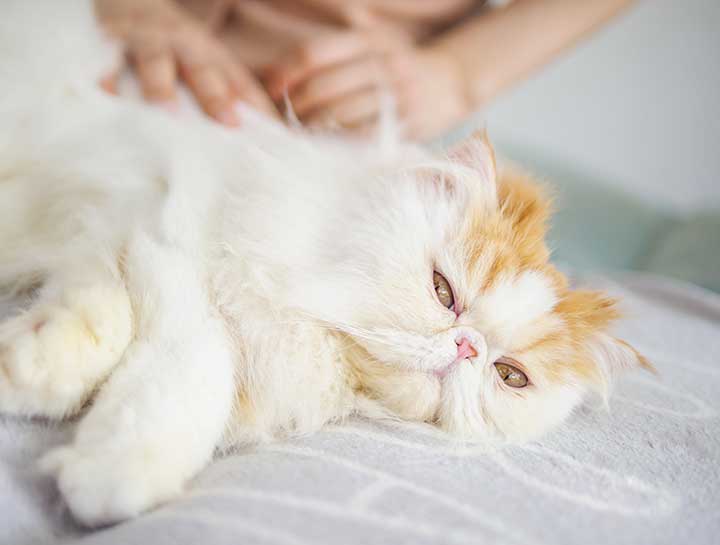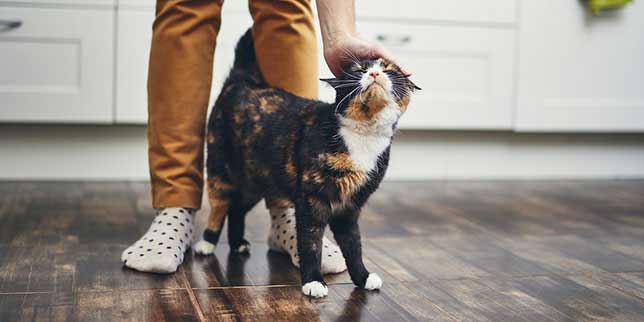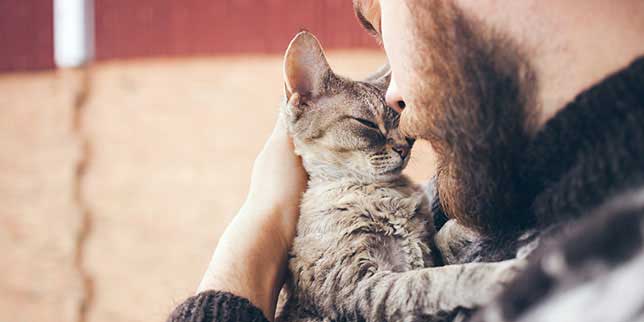“My Cat Isn’t Eating as Much as Usual. What’s Going on?”

Our cats march to the beat of their own drums (and we love them for it), but you’re smart to be on high alert if you notice: “My cat isn’t eating as much as usual.”
In this article, you’ll find:
- Common reasons your cat may not be eating all his or her food
- What you can do at home
- When to be concerned
Let’s jump into possible reasons your cat is eating less than usual…
Your cat may be finding other food sources
Yep, your cat may be getting meals elsewhere.
It’s worth investigating:
- Has your cat been getting into a spare bag of cat food — or dog food — without you knowing it?
- If your cat spends time outside, could your cat be catching mice or having a neighbor feed your cat? (Plenty of people put food out for stray cats.)
- Do you have a guest staying in your home or a child home from college who may be feeding your cat in-between normal mealtimes without you knowing it?

Stress-related issues
Some cats eat less (or stop eating) when they get stressed.
If your cat is stressed, you also may notice your cat is hiding more, and/or you may see blood in your cat’s urine.
While it can be hard to predict what’s causing the stress, cats can get stressed from things like:
- A move to a new home
- A renovation project in your home
- A house guest who is staying with you
- A new cat in the neighborhood that’s prowling
- A new pet in the house
- Your travel plans
Has anything been going on that could be stressing your cat?
Mouth-related issues
There are a number of things that could be going on in your cat’s mouth:
- Dental disease (aka, “periodontal disease”). Most adult cats have some stage of dental disease. One of the things you may notice is your cat is still eating… but your cat’s eating habits have changed. For example, your cat doesn’t want to eat wet food anymore (or vice versa with dry food). Some cats will start swallowing their food whole. They stop trying to bite into it.
- A resorptive lesion. This means there’s a defect in the enamel of one of your cat’s teeth. (It’s similar to having a cavity.) It can be painful for your cat.
- Trauma to your cat’s mouth or head, such as loose teeth or an injury from a catfight.
- Other painful conditions in your cat’s mouth. Not too long ago, our cat veterinarians saw a kitten that had chewed an electrical cord. The kitten got shocked and had sores in its mouth. (Poor lil’ thing!)
- Cancer of the mouth. This is more common in older cats than younger cats. (Your cat may be drooling and have bad breath too.)
Systematic issues (mainly in older cats)
If your cat isn’t eating as much as he used to, there also could be issues going on in other parts of your cat’s body. Your cat may have:
- Cat kidney disease (known as “cat renal disease”). As this disease progresses, cats get pickier and don’t want to eat as much as they used to.
- Liver disease. Your cat may feel nauseous and not want to eat.
- Gastro Similar to liver disease, your cat may feel nauseous and not want to eat — or be picky with eating.
Of these cat diseases, kidney disease is the most common.
“What should I do if my cat isn’t eating as much as usual?”
If you ever have questions about your cat, we always recommend reaching out to a veterinarian, but…
Let’s say you aren’t ready to contact a veterinarian yet.
Maybe you have multiple pets in your home, and you aren’t exactly sure who’s eating what!
It’s time to put on your detective hat.
You may want to confine your cat to one room (like a bathroom or a small bedroom) for 24 to 48 hours.
Make your cat comfortable with food, water, a litter box, and comfortable bedding.
This way, you can observe what’s happening with your cat’s eating habits.
You also can monitor if your cat is having any urinary issues or diarrhea issues.

Another option…
You can try to look in your cat’s mouth.
(We know some cats are more on board with this than others!)
You may be able to notice symptoms like:
- Red gums
- Bleeding gums
- A bad smell in your cat’s mouth
- A lot of tartar build-up, or
- Loose teeth
These symptoms usually suggest a mouth-related issue.
If your cat isn’t eating and is hiding…
Or, you notice other behavior changes…
That’s usually a sign that your cat is sick and not feeling well.
When to be concerned
If cat doesn’t eat one meal and then returns to normal eating habits, this usually isn’t a concern.
But if your cat is not eating for days, it’s important to reach out to a veterinarian.
Dogs can go much longer than cats without eating. When cats stop eating, they start introducing the risk of different diseases.
Soon, you may find yourself needing to address multiple issues, rather than just the original reason your cat wasn’t eating!
Not to mention, your cat is likely is not feeling well and may be in some discomfort.
